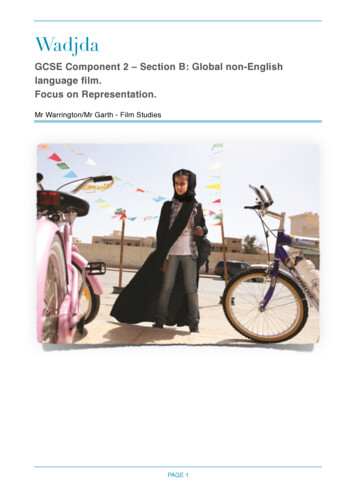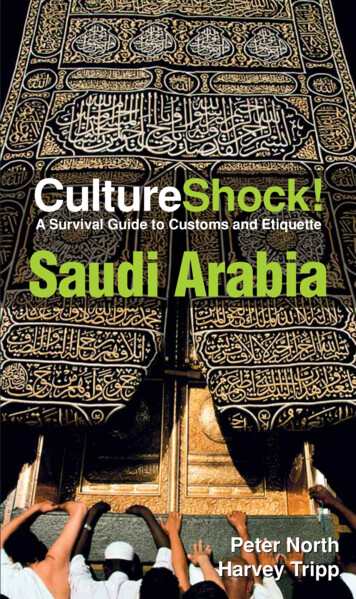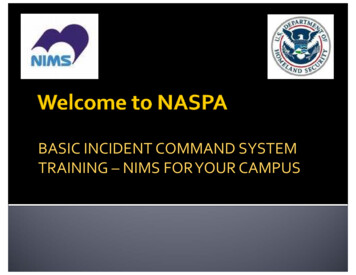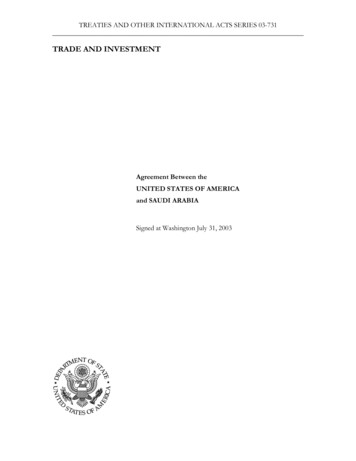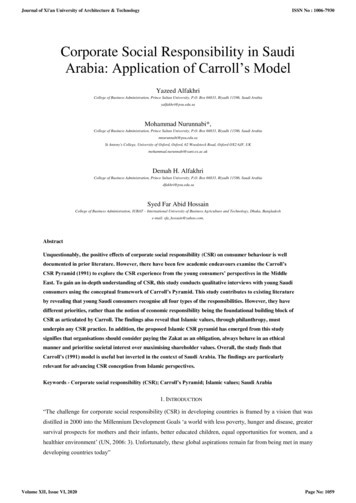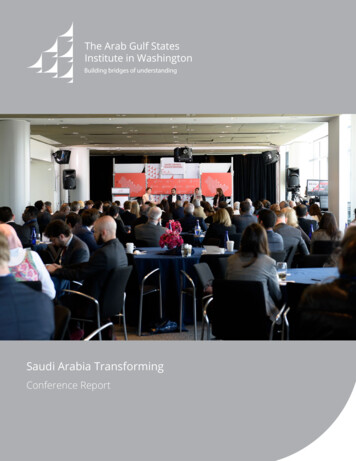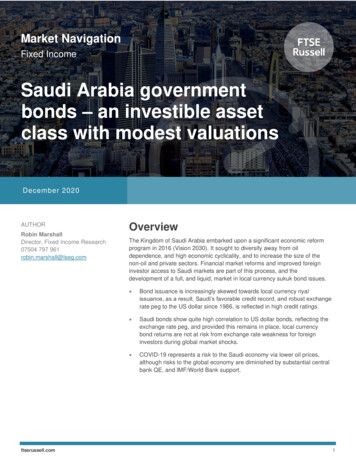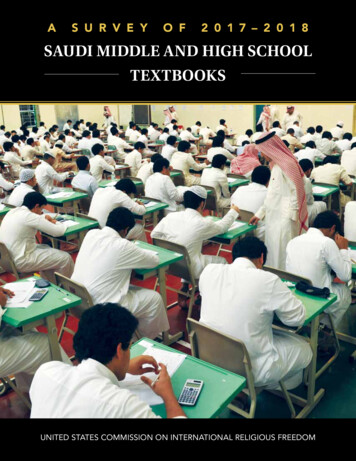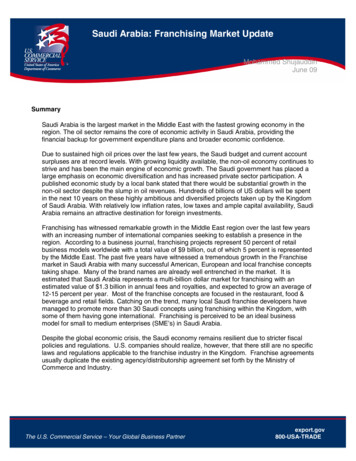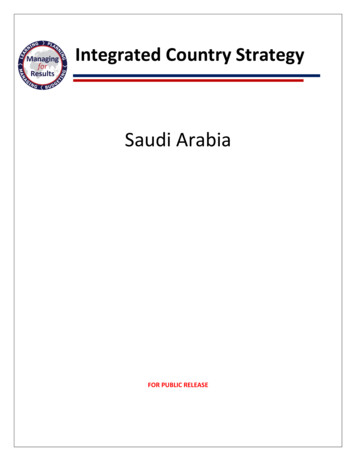
Transcription
Integrated Country StrategySaudi ArabiaFOR PUBLIC RELEASE
FOR PUBLIC RELEASETable of Contents1.Chief of Mission Priorities . 22.Mission Strategic Framework . 53.Mission Goals and Objectives . 74.Management Objectives . 14FOR PUBLIC RELEASEApproved: July 23, 20181
FOR PUBLIC RELEASE1. Chief of Mission PrioritiesThe United States values the strength and durability of our relationship with Saudi Arabia. Overthe next four years, we will continue to sustain our bilateral relationship to address a range ofregional, economic, and security developments.Mission Saudi Arabia’s Integrated Country Strategy (ICS) will guide our continuing engagementin two central ways. First, our ICS will define our priorities for our engagement in Saudi Arabia.Second, our ICS will outline the initiatives we will undertake in pursuit of these priorities,providing a working plan for the next four years. To achieve the strategic vision set forth in ourICS, we will commit ourselves to the energetic pursuit of several key initiatives.We will enhance U.S. security and regional stability by maintaining a strong securitypartnership with the Kingdom.First, we will aim to advance regional stability within a security framework in which the UnitedStates is Saudi Arabia’s preferred partner. We will encourage Saudi Arabia’s role as a helpfuland constructive partner in the prevention and resolution of regional conflicts. We will workwith Saudi officials to address emerging threats, and support the strengthening of Saudisecurity institutions to enhance their operational and strategic capabilities.Second, we will expand our robust counterterrorism relationship to ensure the safety of bothU.S. and Saudi citizens, as well as to protect energy and other infrastructure crucial to theglobal economy. Through cooperation with our Saudi partners, we will disrupt and degradeterrorist groups, including their efforts to finance their activities, and reduce the threat posedby terrorists in Saudi Arabia, the United States, and around the world.Third, we will facilitate legitimate travel to the United States while protecting national securitythrough enhanced visa vetting procedures, fraud detection efforts and cooperation with ourSaudi law enforcement partners.We will strengthen our bilateral economic and commercial partnership with Saudi Arabia.The Saudi Arabian government’s ambitious Vision 2030 socioeconomic reform program is asignificant opportunity to advance the U.S. interest in Saudi Arabia’s long-term economic andsocial stability. As the Saudi Arabian government aims to rapidly grow the Saudi private sectorand develop entirely new economic sectors, we will advocate for and support U.S. companiesas partners in this endeavor. Through engagement with Saudi authorities and the U.S. andSaudi private sectors, we will aim to create opportunities for deeper and broader investment,trade, and commercial relationships. Furthermore, we will work with the Saudi Arabiangovernment to improve the investment climate for American companies, to strengthenintellectual property protections for American products, and to ensure a level economic playingfield so that U.S. companies can compete effectively in local markets.FOR PUBLIC RELEASEApproved: July 23, 20182
FOR PUBLIC RELEASEWe will cooperate closely with the Saudi Arabian government on its leading economic prioritiesso that the Kingdom can sustain the economic prosperity upon which long-term stabilitydepends. With the active participation of American businesses, we will support private sectorled growth to diversify the Saudi economy, create new jobs, and encourage women’sentrepreneurship and participation in the economy. We will intensify our energy dialogue withSaudi Arabia to ensure that it remains a stable, reliable supplier of oil to global markets. Finally,we will work with Saudi authorities to develop new, alternative domestic sources of energy andintroduce energy efficiency measures, and do so in a way that maximizes the participation ofU.S. companies in the evolution of these sectors.We will reinforce Saudi efforts to build institutions and develop civil society in a manner thatencourages U.S. partnerships and supports U.S. interests.We will encourage good governance and the recognition of individual freedoms in the Kingdom.To that end, we will support increased space for civil society and improved mechanisms forpublic participation by historically marginalized groups and voices of tolerance and moderation.We will also support judicial reforms and engage with Saudi officials to increase transparencyand accountability in the legal and judicial system.The U.S.-Saudi partnership is rooted in more than seven decades of close friendship andcooperation. We will strengthen these connections by continuing to provide studentcounseling services and market U.S. educational opportunities to the tens of thousands ofSaudis who study in the United States. Furthermore, we will encourage Saudis and Americansto take advantage of exchange and speaker programs to discuss topics of shared interest andpromote mutual understanding. Finally, we will encourage American performers, artists andathletes to perform in public venues in the Kingdom through cooperative programs with theSaudi government and Saudi private sector.We will support moderate narratives in Saudi society, including narratives supportive ofrelationships with the United States, that blunt and discredit extremist language. We will aimfor such narratives to become the predominant discourse in Saudi society. To that end, we willseek out opportunities for engagement in both traditional and social media. We will encourageSaudi educational institutions to promote examples of tolerance and moderation in textbooksand class materials. Mission Saudi Arabia staff will embrace their public diplomacy roles asrepresentatives of the United States and we will take advantage of opportunities to explain andpromote the United States and our policies.Finally, Mission Saudi Arabia’s consular operations will continue to provide American citizenswith the fast, friendly, and efficient services they need in order to effectively conduct business,study, visit, and reside in the Kingdom.FOR PUBLIC RELEASEApproved: July 23, 20183
FOR PUBLIC RELEASEWe will maximize our resources and improve our efficiency.The Mission will strive to be more integrated in its reporting and management – pursuingcollaboration across sections, constituent posts, and other U.S. missions in the region. To thatend, we will invest in our people and our infrastructure to provide an operational platform insupport of the Mission. We will promote Mission staff effectiveness by reinforcing leadershipand mentorship as professional development necessities, and we will boost morale and pride inour work by committing to a renovation of our facilities and ensuring sufficient resources areavailable to do so. Finally, we will support VIP U.S. visitors to Saudi Arabia and promoteexchanges at all levels.FOR PUBLIC RELEASEApproved: July 23, 20184
FOR PUBLIC RELEASE2. Mission Strategic FrameworkMission Goal 1: U.S. security and regional stability enhanced by a strong U.S.-Saudi securitypartnership.Mission Objective 1.1: Advance regional stability within a security framework in which theUnited States is the preferred partner.Mission Objective 1.2: Terrorist groups and networks disrupted and degraded throughincreased counterterrorism cooperation, strengthened security institution capabilities, anddisruption of terror finance, resulting in a reduced terrorist threat level both in Saudi Arabiaand in the United States.Mission Objective 1.3: Facilitate legitimate travel to the United States while protectingnational security through enhanced visa vetting procedures, fraud detection efforts andcooperation with Saudi law enforcement partners.Mission Goal 2: U.S.-Saudi bilateral partnership strengthened through a broad, robusteconomic and commercial relationship.Mission Objective 2.1: Increased bilateral trade and investment create jobs and contributeto economic growth in both the United States and Saudi Arabia by leveraging the bilateralTrade and Investment Framework Agreement (TIFA) and opportunities created by Vision2030 reforms.Mission Objective 2.2: Supported by Mission advocacy, U.S. companies contribute to SaudiArabia’s economic diversification, job creation, and GDP growth in order to support U.S.interests in Saudi Arabia’s long-term economic and social stability.Mission Objective 2.3: Saudi Arabia aligns its energy policies more consistently with U.S.energy security, adopts a sustainable course to meet domestic demand, and continues as aleading energy supplier to global markets.Mission Goal 3: Institution building and social development in Saudi Arabia reinforced in amanner reflecting U.S. interests and encouraging U.S. partnerships.Mission Objective 3.1: Good governance and recognition of individual freedoms areenhanced by increasing space for civil society and improving mechanisms for publicparticipation by marginalized groups and voices of tolerance and moderation.FOR PUBLIC RELEASEApproved: July 23, 20185
FOR PUBLIC RELEASEMission Objective 3.2: U.S.-Saudi ties are strengthened through greater interactionbetween the Saudi and American peoples, including through education and culturalexchanges.Mission Objective 3.3: Moderate and tolerant narratives, including messages supportive ofrelationships with the United States, become the predominant discourse in Saudi society,blunting and discrediting extremist and intolerant language.Mission Objective 3.4: American citizens receive the consular support and services theyneed to conduct business, study, visit, and reside safely in Saudi Arabia.Management Objective 1: Improve human capital resources by providing additionalprofessional development opportunities for local staff and by targeting an emerging generationof Saudi professionals for open positions.Management Objective 2: Better support record numbers of ICASS customers by optimizingthe use of available facilities and infrastructure, including reallocating space within theEmbassy’s Chancery and incorporating into it the Yemen Affairs Unit.Management Objective 3: Increase the efficiency and quality of service deliverables bystreamlining management controls, including in the provision of frequently used services suchas support for VIP visitors and travel by Mission personnel.FOR PUBLIC RELEASEApproved: July 23, 20186
FOR PUBLIC RELEASE3. Mission Goals and ObjectivesMission Goal 1: U.S. security and regional stability enhanced by a strong U.S.-Saudi securitypartnership.Description and Linkages: In order to advance U.S. security and regional stabilityinterests, including a Middle East free from terrorists, not dominated by powers hostile to theUnited States, and that contributes to a stable global energy market, the Mission will work topromote a security framework that is enhanced by a strong U.S.-Saudi security partnership.U.S. military strength is a vital component of the competition for influence in the region.Through security and defense partnerships, the Mission will continue to support Saudi effortsto transform their security and defense institutions through modernization and acquisition ofnecessary capabilities. The Mission will also continue to partner with Saudi Arabia to advanceefforts to disrupt, degrade, and defeat terrorist groups and networks through increasedcounterterrorism cooperation. Finally, the Mission will advance U.S. border security throughenhanced vetting processes, information sharing with Saudi law enforcement partners, andwork with international and private sector partners to raise security standards. Linkages:National Security Strategy (2017), Pillar I, Pillar III and Regional Context; U.S. Department ofState / U.S. Agency for International Development Joint Strategic Plan (FY 2018-2022), Goal 1and Goal 3.Mission Objective 1.1: Advance regional stability within a security framework in which theUnited States is the preferred partner.Justification: The Saudi Arabian government has shown increasing willingness to takeon a more direct role in regional security issues, while remaining open to U.S. input andguidance. Notably, Saudi Arabia has been a leading member of the internationalcoalition to defeat ISIS. In support of U.S. objectives for a stable and prosperous region,we will continue to urge the Saudi Arabian government to allocate appropriateresources to support national and regional security initiatives, and to remain activelyengaged with U.S. government and multilateral organizations.Mission Objective 1.2: Terrorist groups and networks disrupted and degraded throughincreased counterterrorism cooperation, strengthened security institution capabilities, anddisruption of terror finance, resulting in a reduced terrorist threat level both in Saudi Arabia andin the United States.FOR PUBLIC RELEASEApproved: July 23, 20187
FOR PUBLIC RELEASEJustification: The United States and Saudi Arabia enjoy a longstanding securityrelationship, and counterterrorism cooperation remains strong. The Saudi Arabiangovernment works closely with the United States to disrupt and degrade terroristgroups and networks, supporting enhanced bilateral cooperation to ensure the safety ofboth U.S. and Saudi citizens. The Saudi Arabian government continues to build itscounterterrorism capacity and seeks assistance from the United States to transfertechnical knowledge, skills, resources, and best practices to protect criticalinfrastructure from terrorist attacks, especially in the energy sector, and to enhancepublic security, including border protection and cyber security. Saudi authoritiescontinue to arrest suspected militants, develop domestic security forces, implementimproved border security measures, and strengthen controls on terrorfinance. Prominent officials and religious leaders make public statements againstextremist ideology and behavior, and the Saudi Arabian government has launchedseveral efforts related to countering violent extremism, including the Global Center forCombating Extremist Ideology (also known as “Etidal”). The Mission continues to focuson enhancing U.S. and Saudi counterterrorism coordination, as Saudi Arabia refines itscapacity to prevent and counter terror finance through the development of regulatory,investigative, and enforcement entities.Mission Objective 1.3: Facilitate legitimate travel to the United States while protectingnational security through enhanced visa vetting procedures, fraud detection efforts andcooperation with Saudi law enforcement partners.Justification: Facilitating the travel of Saudi citizens to the United States promotes U.S.economic interests and greater understanding between the Saudi and Americanpeoples. Exposure of Saudis to American values through study and personal travel tothe United States contributes to greater openness and tolerance between our nations.The Mission has an obligation and interest in providing prospective Saudi visa applicantswith accurate, readily-accessible information about U.S. visa requirements and access tovisa appointment services within reasonable wait times. The U.S. passport and visadocumentation process is of great importance to the Mission and directly impacts U.S.national security. A significant percentage of applicants for both nonimmigrant andimmigrant visas at Mission posts are subject to supplementary vetting procedures.Close, effective cooperation between the Mission, U.S. government agencies, and Saudilaw enforcement partners, is critical to U.S. national security.FOR PUBLIC RELEASEApproved: July 23, 20188
FOR PUBLIC RELEASEMission Goal 2: U.S.-Saudi bilateral partnership strengthened through a broad, robusteconomic and commercial relationship.Description and Linkages: The U.S.-Saudi economic and commercial relationship is afundamental pillar of the overall bilateral partnership. Broadening our economic ties – throughincreased trade and investment and other means – therefore contributes to closer bilateralrelations and collaboration with a key regional partner. We will leverage more robust economicand commercial ties to advance U.S. national interests in a broad variety of ways – by openingnew markets, increasing U.S. exports, improving the local investment climate, securingcontracts for U.S. companies, creating jobs for American citizens at home, and increasing U.S.prosperity. We will promote a free, fair, and reciprocal trade relationship with Saudi Arabiathat contributes to a robust and secure U.S. economy. Moreover, our robust economic andcommercial partnership with Saudi Arabia will advance the U.S. interest in ensuring that SaudiArabia remains a prosperous, stable partner in a volatile region and a reliable supplier of energyto global markets. Linkages: National Security Strategy (2017), Pillars II and III; U.S. Departmentof State / U.S. Agency for International Development Joint Strategic Plan (FY 2018-2022), Goals2.1, 2.2, and 2.3.Mission Objective 2.1: Increased bilateral trade and investment create jobs and contribute toeconomic growth in both the United States and Saudi Arabia by leveraging the bilateral Tradeand Investment Framework Agreement (TIFA) and opportunities created by Vision 2030reforms.Justification: Saudi Arabia has the 20th-largest economy in the world and it is the onlyArab country in the G-20. Saudi Arabia is the United States’ largest goods tradingpartner in the Middle East and North Africa region, and our 22nd largest goods tradingpartner in the world. The statistics reflect a rich, diverse economic relationship withSaudi Arabia that serves as a fundamental pillar of our overall partnership with theKingdom. There is great potential to strengthen our economic relationship even furtherover the next four years as the Saudi government pursues its ambitious Vision 2030economic reform plans. The scale and breadth of this program will open tremendoustrade and investment opportunities for U.S. businesses and carries the potential tocreate jobs and wealth in both nations. Saudi Arabia is still adjusting its trade policiesand practices to international norms, providing the United States with ampleopportunity to shape Saudi rules, standards, and procedures in a manner that facilitatesU.S. exports, increases market access for U.S. goods and services, and improves the localinvestment climate. We will leverage our Trade and Investment Framework Agreement(TIFA) and other avenues of dialogue to improve conditions for trade and investment,FOR PUBLIC RELEASEApproved: July 23, 20189
FOR PUBLIC RELEASEthereby enabling the private sector to increase trade, investment, job creation, andoverall prosperity in both nations.Mission Objective 2.2: Supported by Mission advocacy, U.S. companies contribute to SaudiArabia’s economic diversification, job creation, and GDP growth in order to support U.S.interests in Saudi Arabia’s long-term economic and social stability.Justification: The United States has a vital stake in Saudi Arabia’s continued economicprosperity and social stability. Pursuant to its ambitious Vision 2030 socioeconomicreform program, Saudi Arabia has taken significant steps to diversify its economy andcreate private-sector jobs for Saudi citizens to meet the demands of the Kingdom’syoung and rapidly growing population. Economic diversification will increase SaudiArabia’s resilience to fluctuations in the oil market and foster sustainable private-sectorjob creation, including for Saudi Arabia’s increasingly well-educated female population.U.S. capital and expertise can contribute meaningfully to the diversification of the Saudieconomy away from its dependence on oil exports. Supported by Mission advocacy,U.S. companies can provide significant support for the achievement of the Saudi Arabiangovernment’s Vision 2030 goals, thereby helping to bolster the long-term social stabilityof a vital partner in a volatile region.Mission Objective 2.3: Saudi Arabia aligns its energy policies more consistently with U.S.energy security, adopts a sustainable course to meet domestic demand, and continues as aleading energy supplier to global markets.Justification: Saudi Arabia’s oil exports – and particularly the country’s ability tocompensate for supply disruptions elsewhere through strategic deployment of its spareproduction capacity – have long been essential to global oil-market stability and growthof the world economy. Saudi oil will remain important to the global economy over thecoming decades. In recent years, however, rising domestic oil consumption has eateninto Saudi spare capacity. By increasing domestic energy prices and the efficiency ofenergy usage, consumption growth has slowed. At the same time, Saudi Arabia hasembarked on ambitious programs in nuclear energy, renewable energy, energyefficiency, and natural gas to replace the use of oil in power generation. Moreover, oiland the wealth derived from its production undergird Saudi Arabia’s ability to act as avaluable U.S. partner on a wide range of political, economic, and security issues. It is inthe U.S. interest to support the diversification of the Saudi energy basket (includingalternatives) and adoption of energy management, conservation, and efficiencymeasures, and to do so in a way that maximizes the participation of U.S. companies inthe evolution of these sectors.FOR PUBLIC RELEASEApproved: July 23, 201810
FOR PUBLIC RELEASEMission Goal 3: Institution building and social development in Saudi Arabia reinforced in amanner reflecting U.S. interests and encouraging U.S. partnerships.Description and Linkages: As the Saudi Arabian government pursues its Vision 2030plan for economic and social development, the Mission will engage Saudi public and privateactors to encourage the development of institutions and practices that support U.S. interestsand encourage U.S. partnerships. We will advocate for the rule of law, good governance, andthe protection of individual freedoms, which will enable Saudi Arabia to reach its fullpotential. Through educational, professional, and cultural exchanges, we will build strongrelationships between the peoples of the United States and Saudi Arabia, relationships thatsupport our mutual security and economic goals. We will partner with Saudi Arabian public andprivate organizations to counter violent extremism, and we will support moderate, tolerantnarratives to counter extremist and intolerant ideology in order to eliminate the environmentin which terrorism thrives. By providing excellent consular services and engaging relevant SaudiArabian authorities, we will strive to make it possible for Americans to conduct business, study,visit, and reside safely in Saudi Arabia. The presence of a strong American community in SaudiArabia supports and advances U.S. interests across a variety of Mission goals. By working toensure that Saudi Arabia’s institutions and social development reflect U.S. interests andencourage U.S. partnerships, we will build the relationships and set the stage to achieve ourcurrent and future national security priorities. Linkages: National Security Strategy (2017),Pillar I, II, III and IV; U.S. Department of State / U.S. Agency for International Development JointStrategic Plan (FY 2018-2022), Goals 1, 2 and 3.Mission Objective 3.1: Good governance and recognition of individual freedoms are enhancedby increasing space for civil society and improving mechanisms for public participation bymarginalized groups and voices of tolerance and moderation.Justification: For the promotion of long-term domestic stability within the Kingdom, itis in the U.S. interest to ensure Saudi Arabia balances national security concerns withgood governance, respect for individual freedoms, and the rule of law. To support theachievement of this balance, the U.S. government will seek to cultivate a wide range ofgovernment and civil society relationships, bolster those who champion tolerance,moderation, and rule of law, and develop the leadership skills of social leaders,influencers, and civil society organizations that seek to advance good governance in theKingdom.FOR PUBLIC RELEASEApproved: July 23, 201811
FOR PUBLIC RELEASEMission Objective 3.2: U.S.-Saudi ties are strengthened through greater interaction betweenthe Saudi and American peoples, including through education and cultural exchanges.Justification: Saudi Arabia is the fourth-largest source country of foreign studentsstudying in the United States. Saudi students and the Ministry of Education prefer forSaudi students to study in the United States, and seek to make Saudi students in theUnited States successful. Concurrently, the Ministry of Education seeks to improve andmodernize Saudi teaching practices. The Mission supports Saudi Arabia’s efforts toeducate young Saudi citizens within the U.S. educational system and with the support ofU.S. professionals. Similarly, the Mission identifies nearly 150 Saudi young leaders andprofessionals each year to participate in U.S. government exchange programs in order tobuild lasting connections between Saudi and American citizens, and continues to engagealumni of these exchanges to serve as effective advocates for the U.S.-Saudirelationship, to amplify the Mission’s engagement on priority issues, and to supportalumni as models for active civic, economic, and political participation. As part of Vision2030’s goals to develop opportunities for family recreation within Saudi Arabia, theGovernment of Saudi Arabia is working to offer public performances of global talent.The Mission supports these efforts in order to familiarize the Saudi public with Americanperformers and culture, and promote commercial opportunities for American and Saudirecreational businesses. These educational, cultural, and exchange activities seek topromote American values and influence, and establish lasting, mutually beneficialrelationships between the peoples of Saudi Arabia and the United States.Mission Objective 3.3: Moderate and tolerant narratives, including messages supportive ofrelationships with the United States, become the predominant discourse in Saudi society,blunting and discrediting extremist and intolerant language.FOR PUBLIC RELEASEApproved: July 23, 201812
FOR PUBLIC RELEASEJustification: Political and social forces both outside and within the Kingdom generatepropaganda in support of violent extremist ideologies. While available polling datasuggests that the majority of Saudis reject extremist ideologies, even a small percentageof the population acting in response to this propaganda represents a threat to domesticand regional stability, the safety of American and Saudi citizens, and the safety of peoplearound the world. The Saudi Arabian government is mindful of this threat and is activelyengaged in combatting it, both through countering terrorist acts directly anddiscrediting the ideologies that support terrorism. Prominent Saudi officials andreligious leaders make public statements against extremist ideology and behavior, andthe Saudi Arabian government has launched several efforts related to countering violentextremism (CVE), including the Global Center for Combating Extremist Ideology (alsoknown as “Etidal”). The Jeddah-based Organization of Islamic Cooperation (OIC) haslaunched a nascent Center for Dialogue, Peace, and Understanding with the Sawt AlHikma (The Voice of Wisdom) as its operational arm supporting CVE messaging anddelegitimizing extremist discourse. The United States partners with Saudi Arabia tocounter extremist and intolerant ideology in order to eliminate the threat of violentextremism and terrorism, while encouraging respect for freedom of expression.Mission Objective 3.4: American citizens receive the consular support and services they needto conduct business, study, visit, and reside safely in Saudi Arabia.Justification: The approximately 80,000 members of the resident American communityin Saudi Arabia are ambassadors of American values at a time of significant culturalchange in the Kingdom. Many of them work in sectors such as energy and defense thatare relevant to U.S. strategic and economic interests in the region. Terrorism has longconstituted a significant threat to American citizens in the Kingdom and ballistic missileattacks by rebels in Yemen have emerged recently as another potent threat. ProvidingAmerican citizens with accurate, timely information about potential threats andpreparing to assist them in the event of a crisis remain core Mission concerns. TheVision 2030 social and economic reform program is advancing rapidly in some areas thatcould have implications for demand for consular services, most notably in the openingof the country to tourism. However, the enduring challenges of the Saudi legal systemand cultural context mean that American citizens require a high level of consularsupport. The presence of a vibrant American community in Saudi Arabia supports andadvances U.S. interests across a variety of Mission goals and is not possible without theready availability of top quality consular services.FOR PUBLIC RELEASEApproved: July 23, 201813
FOR PUBLIC RELEASE4. Management ObjectivesManagement Objective 1: Improve human capital resources by providing additionalprofessional development opportunities for local staff and by targeting an emerging generationof Saudi professionals for open positions.Justification: To facilitate ongoing Mission expansion efforts, we will maximize ourexistin
cooperation with Saudi law enforcement partners. Mission Goal 2: U.S.-Saudi bilateral partnership strengthened through a broad, robust economic and commercial relationship. Mission Objective 2.1: Increased bilateral trade and investment create jobs and contribute to economic growth in both the United States and Saudi Arabia by leveraging the .
